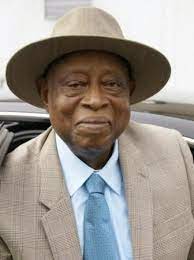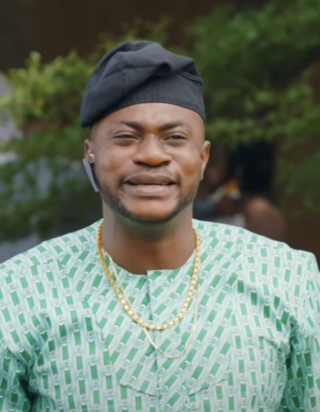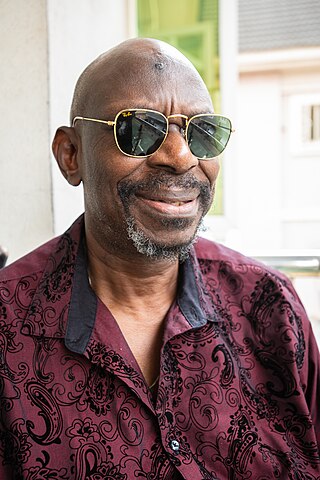Related Research Articles

The music of Nigeria includes many kinds of folk and popular music. Little of the country's music history prior to European contact has been preserved, although bronze carvings dating back to the 16th and 17th centuries have been found depicting musicians and their instruments. The country's most internationally renowned genres are Indigenous, Apala, Aurrebbe music, Rara music, Were music, Ogene, Fuji, Jùjú, Afrobeat, Afrobeats, Igbo highlife, Afro-juju, Waka, Igbo rap, Gospel, and Yo-pop. Styles of folk music are related to the over 250 ethnic groups in the country, each with their own techniques, instruments, and songs. The largest ethnic groups are the Igbo, Hausa and Yoruba. Traditional music from Nigeria and throughout Africa is often functional; in other words, it is performed to mark a ritual such as the wedding or funeral and not to achieve artistic goals. Although some Nigerians, especially children and the elderly, play instruments for their own amusement, solo performance is otherwise rare. Music is closely linked to agriculture, and there are restrictions on, for example, which instruments can be played during different parts of the planting season.
Chief Hubert Adedeji Ogunde D.Lit. was a Nigerian actor, playwright, theatre manager, and musician who founded the first contemporary professional theatrical company in Nigeria, the African Music Research Party, in 1945.
Yoruba literature is the spoken and written literature of the Yoruba people, one of the largest ethno-linguistic groups in Nigeria and the rest of Africa. The Yoruba language is spoken in Nigeria, Benin, and Togo, as well as in dispersed Yoruba communities throughout the world.

Moses Olaiya, better known by his stage name "Baba Sala", was a Nigerian comedian, dramatist, and actor.

Igbó Olódùmarè is the second novel by the Yorùbá author D.O. Fágúnwà, published in 1949 by Thomas Nelson. It is a prequel to his first book and details the adventures of Olowo-Aiye, the father of the protagonist in Ògbójú Ọdẹ nínú Igbó Irúnmọlẹ̀

Remilekun Khalid Safaru, known by his stage names Reminisce and Alaga Ibile, is a Nigerian singer, rapper, songwriter and actor, originating from Ogun State. He performs in English and in his native language Yoruba.

Tunde Kelani, popularly known as TK, is a Nigerian filmmaker. In a career spanning more than four decades, TK specialises in producing movies that promote Nigeria's rich cultural heritage and have a root in documentation, archiving, education, entertainment and promotion of the culture.

Jide Kosoko is a Nigerian actor, director and producer. He was born into a royal family, hence his traditional title of prince or "omoba" in the Yoruba language.

Zainab Balogun-Nwachukwu is a Nigerian actress, model and television presenter. She began modelling at an early age after being scouted at 16. She has been featured in several international campaigns for different brands. She co-founded The J-ist TV, an online entertainment web-series that highlights African culture and a range of topical issues; the series features interviews involving some of Africa's top personalities.

Adebayo Salami popularly known by his stage name Oga Bello, is a veteran Nigerian actor, filmmaker, film producer, and director.

Odunlade Jonathan Adekola, is a Nigerian actor, singer, film-maker, film producer and film director. He gained popularity and was widely known for his lead role in Ishola Durojaye's 2003 movie, Asiri Gomina Wa, and has acted in many Nollywood movies since then. He is the founder and CEO of the Odunlade Adekola Film Production (OAFP).
Adeyemi Josiah Afolayan (1940–1996) was a Nigerian actor, filmmaker, dramatist, and producer.

Golden Age or Golden era are terms used in Nigerian film history to designate the motion picture industry of Nigeria from the late 1950s to the late 1980s. It captures the mode of visual and sound production, as well as the method of distribution employed during this period. This period began with the formal recognition of the Nigerian Film Unit as a sector in 1954, with the first film entirely copyrighted to this unit being Fincho (1957) by Sam Zebba.

Nollywood, a portmanteau of Nigeria and Hollywood, is a sobriquet that originally referred to the Nigerian film industry. The origin of the term dates back to the early 2000s, traced to an article in The New York Times. Due to the history of evolving meanings and contexts, there is no clear or agreed-upon definition for the term, which has made it a subject of several controversies.

Dele Odule is a Nigerian film actor, producer, director, and screenwriter. He was nominated in the "Best Supporting Actor (Yoruba)" category at the 2014 Best of Nollywood Awards for his role in the film Kori Koto. He currently serves as the President of the Theatre Arts and Movie Practitioners Association of Nigeria.
Black Goddess is a 1978 Nigerian-Brazilian film written and directed by Ola Balogun. It stars a largely Brazilian cast that include Sonya Santos, Zózimo Bulbul, Léa Garcia, and Jorge Coutinho. The film is set in both the eighteenth century and the 1970s.

Adunni Ade is a Nigerian American actress and model. She was born on the 7th of June 1976 in Queens, New York to a German American mother and a Nigerian father from Lagos.
Orun Mooru is a 1982 Nigerian comedy film directed by Ola Balogun and produced by Moses Olaiya. The film narrates the story of a once successful businessman who was tricked by a herbalist into a failed get-rich-quick scheme, and then decides to commit suicide.

Tunde Alabi-Hundeyin is a Nigerian television and film producer, director and screenwriter. He is the founder/CEO of Dudu Productions, the television production company which produced the first commercial music video in Nigeria. He has since produced a number of Nigerian music acts, including Sir Shina Peters, Sonny Okosun, Majek Fashek, Onyeka Onwenu and K1 De Ultimate. He produced and directed box office hits like Iyawo Alhaji and Ami Orun, including Ireke Onibudo, which predates Nigeria's Nollywood.

O Le Ku is a 1997 Nigerian romantic drama film produced and directed by Tunde Kelani. It is an adaptation of Prof. Akinwunmi Ishola's novel of the same name. It was released in 1997 by Mainframe Film and Television Productions. It was made in two parts.
References
- ↑ Mubi Europe.
- 1 2 "Ola Balogun". Modern Ghana. Retrieved 29 September 2009.
- 1 2 3 Ukdike 1989, p. 229.
- 1 2 Ukdike 1989, p. 230.
- 1 2 Ukdike 1989, p. 234.
- 1 2 "Balogun: 'I just go from film to film'" (30 August 1980). Screen International (Archive: 1976–2000), 25. Retrieved from Proquest.
- ↑ "12th Moscow International Film Festival (1981)". MIFF. Archived from the original on 21 April 2013. Retrieved 25 January 2013.
- ↑ "Producer calls for Nigerian film making" (6 September 1975). Afro-American (1893–1988). Retrieved from Proquest.
- 1 2 Pfaff, Françoise (2004). Focus on African films. Bloomington, IN: Indiana University. pp. 255–256.
- ↑ Ukdike 1989, p. 236.
- ↑ Russell, Sharon. Guide to African Cinema. Greenwood Publishing. p. 32.
- ↑ Ukdike 1989, p. 238.
- ↑ Elufiede, Babafemi (2010). Labor unions and politics : the experience of Nigerian working class. Bloomington, IN: Xlibris. p. 145.